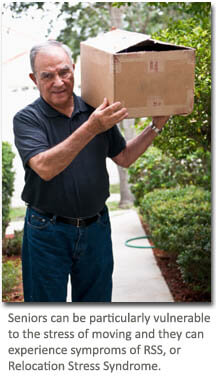What Is Relocation Stress Syndrome (RSS) and How It Affects Seniors Moving Into Assisted Living

Summary: Harriet talks about the syndrome known as RSS, or Relocation Stress Syndrome, and how it relates to older adults who are getting ready to make the move into an assisted living or other long-term care environment.
Author: Harriet Hodgson exclusively for Assisted Living Directory
Harriet is a contributor for Assisted Living Directory

Relocation Stress Syndrome (RSS) became a medical diagnosis in 1992, yet the feelings that go with it have been known for years. The syndrome is associated with older adults who are getting ready to move from private residences to Assisted Living or long-term care. This stress may continue long after the move.
Stress is understandable, for moving is one of the most stressful experiences of life.
After my father-in-law suffered a stroke and had difficulty with the activities of daily living, family members asked him to move to a group high rise with support services. Dad rejected the idea loudly. But family members didnt give up and we had several family meetings with him.
Finally, dad agreed to move, but he was really grumpy about. His worry often turned to anger and he would lash out at family members. The sorting groups in his condo, keep and donate, made him furious. Though I didnt know it then, I now realize he had Relocation Stress Syndrome, which is also called Transition Trauma.
RSS Symptoms
What are the symptoms of Relocation Stress Syndrome? They include anxiety, confusion, helplessness, loneliness, withdrawal, ongoing worry, and pessimism. Some people have trouble sleeping. Just the thought of moving would send dad into a blue funk and his dark mood would last for days. It was impossible to reason with him when he was in this mood.
Colleen Smart, a Certified Senior Advisor, describes this stress in an ElderCare Blog article, Relocation Stress Syndrome.any variables contribute to RSS, according to Smart, and research shows that seniors may take longer to adjust than younger people. The root cause of RSS is loss loss of youth, possessions, control, and everything that is familiar.
If he moved to Assisted Living my father-in-law would have to adjust to a new place, new rules, and a new way of living. Living in a smaller place meant he would have to part with chairs, tables, lamps, pictures, and family heirlooms like apothecary jars from Peru. Dad let go of many things, but each parting was painful for him. Watching the process was painful for me.
Ways to Help
You can make your loved onetransition to Assisted Living easier. First, watch for the symptoms of Relocation Stress Syndrome. Keeping written notes about the symptoms and their severity may be helpful. Monitoring alcohol consumption may also be wise. Seek medical help if you think your loved one is depressed.
Second, try to be reassuring. Talk about the advantages of Assisted Living, such as personal safety and medical back-up. My husband and I talked about the people dad knew who lived in the high rise. You will be among friends,we assured him. Being close to Mayo Clinic, where he had practiced medicine, was also a plus for dad.
Third, accept your loved onefeelings of loss. Mentally reverse roles and ask yourself, How would I feel if I was dealing with so many changes?Identify positives, such as giving family keepsakes to adult children and grandchildren. We received some of the Peruvian apothecary jars and a framed tapestry. When dad came for dinner (and he came often), he saw these items in our home.
Finally, stay connected with your loved one. Call the day after the move and continue to stay in touch. Visit often, eat dinner there, include your loved one in family functions, and plan special events. At Christmas time, for example, we drove dad around town to see the holiday lights and ended the tour with dinner at our house.
Moving was emotional work for dad and physical work for us. My sister-in-law helped dad sort and categorize items, a monumental task that took weeks. I was in charge of sprucing up his condo inspection, cleaning, painting, buying and installing new carpet and appliances. In time, all of our worry and all of our work paid off, for Dad loved Assisted Living.
Copyright 2012 by Harriet Hodgson
Article by Harriet Hodgson exclusively for Assisted Living Directory
Comming Soon:
No Obligation
Assisted Living with What Is Relocation Stress Syndrome (RSS) and How It Affects Seniors Moving Into Assisted Living


